

Cut Through the Hype: Our Tips for Successful Social Learning - LEO Learning. Social learning is a big trend in L&D circles, and many organizations are looking for ways to promote collaboration and discussion within their learning programs—often by investing in new tools or platforms.
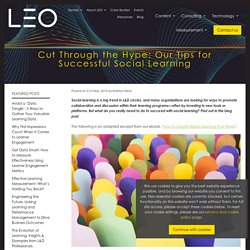
But what do you really need to do to succeed with social learning? Find out in this blog post. The following is an adapted excerpt from our ebook, ‘How to Create Digital Learning That Works’. The Workplace Self-Training Paradigm. Much has been made of the abbreviation of employment tenure, now averaging just four years according to the Bureau of Labor Statistics.
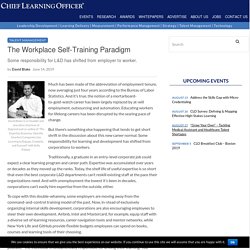
And it’s true, the notion of a mortarboard-to-gold-watch career has been largely replaced by at-will employment, outsourcing and automation. Educating workers for lifelong careers has been disrupted by the searing pace of change. But there’s something else happening that tends to get short shrift in the discussion about this new career normal. Www.forbes. Learning and development represents billions of dollars in investments for businesses – yet every time, I start a learning and development workshop by asking the audience a version of “Who resents being here today?”
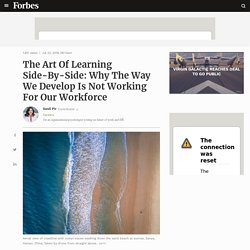
And with some encouragement, I get to meet a whole new community of peers who are able to list a long number of logical and tangible reasons as to why they dislike corporate trainings. Many share that they usually attend learning and developmental activities due to corporate mandate. Many refer to the fact that classes cover aspirational terms like equality, inclusion, diversity, balance and the concept of impact is largely thrown around; however, often, their corporate cultures are far away from embracing any of these values. Others refer to content irrelevance, pointing to shared insights being “outdated” and/or “inapplicable” on the job. Some try to calculate the return of investment in time or in output during our conversations. Absolutely. A Fragmented Reality They don't. Episode 9: What is the Future of Learning? (Interview with Catalina Schveninger, Global Head of Learning at Vodafone) — myHRfuture. How is Vodafone Innovating in Learning and Development? — myHRfuture.
David Green: Obviously, there's been a huge change happening in the learning space, and what are some of the key trends that you're seeing, and trying to apply with Vodafone?

Catalina Schveninger: We're seeing a couple of very interesting trends. I think the one that I'm excited about is that we finally got a grip of skills, so if you look at skills and capabilities, a bit of the skills of today, but mainly the skills of tomorrow, what the digital world is bringing in terms of the capabilities agenda is very exciting, and learning, we've done a lot of work already on customising a learner's experience, and catering to that skill set and the ability to upskill ourselves, and re-skill, so you see a lot of recommendations driven by skills. You see a lot of skill assessment and skill profiling in industry, things that we also work with in Vodafone.
Most recently, you see a lot of interesting accreditation and certification is back again. It used to be back in the days. Learning and Development skills for the digital age. Learning and Development teams have been asked to provide better services and make a bigger impact on their businesses for the best part of 10 years now.
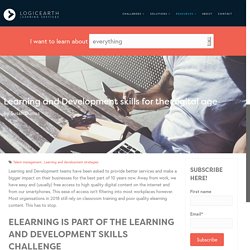
Away from work, we have easy and (usually) free access to high quality digital content on the internet and from our smartphones. This ease of access isn't filtering into most workplaces however. Most organisations in 2018 still rely on classroom training and poor quality elearning content. This has to stop. The frustrating thing is that while eLearning was seen as a way of the future, for the most part it has just replaced classroom training like-for-like, without improving or providing richer learning options for staff. Making Learning a Part of Everyday Work.
As automation, AI, and new job models reconfigure the business world, lifelong learning has become accepted as an economic imperative. Eighty percent of CEOs now believe the need for new skills is their biggest business challenge. For employees, research now shows that opportunities for development have become the second most important factor in workplace happiness (after the nature of the work itself).
At the most fundamental level, we are a neotenic species, born with an instinct to learn throughout our lives. So it makes sense that at work we are constantly looking for ways to do things better; indeed, the growth-mindset movement is based on this human need. Why Leadership Development Feels Broken: And How We're Fixing It. The market for leadership development solutions is enormous: more than $14 billion is spent by corporations and there are more than 70,000 books and videos on the topic.
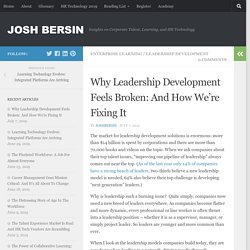
When we ask companies about their top talent issues, “improving our pipeline of leadership” always comes out near the top. (As of the last year only 14% of companies have a strong bench of leaders, two-thirds believe a new leadership model is needed, 64% also believe their top challenge is developing “next generation” leaders.)
Learning Technology Evolves: Integrated Platforms Are Arriving. The enormous market for training and learning tools is very fragmented.
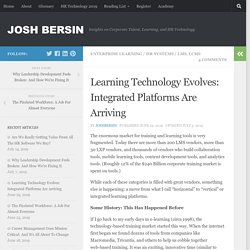
Today there are more than 200 LMS vendors, more than 30 LXP vendors, and thousands of vendors who build collaboration tools, mobile learning tools, content development tools, and analytics tools. (Roughly 12% of the $240 Billion corporate training market is spent on tools.) While each of these categories is filled with great vendors, something else is happening: a move from what I call “horizontal” to “vertical” or integrated learning platforms. Some History: This Has Happened Before If I go back to my early days in e-learning (circa 1998), the technology-based training market started this way.
In the early 2000s, however, the market grew up. Learning Technology Evolves: Integrated Platforms Are Arriving. Walmart Turns to VR to Pick Middle Managers. Lori Niles-Hofmann at Degreed Lens 2017.